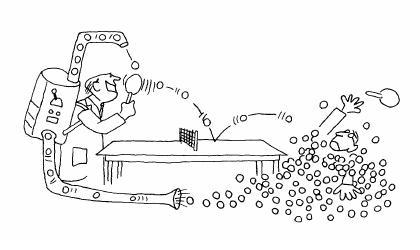Reading E-books Anonymously
Sep 15th, 2011 by fbermejo
Months ago I was trying to decide whether it was worth it for me to purchase a Kindle reader (not an early adopter, I know). Since I was not sure, I decided to try first with the Kindle app on my laptop. I downloaded it, played around with it for a bit, and forgot about it.
A few days ago I decided to try again and started reading my first Kindle book on my computer: Eli Pariser’s “The Filter Bubble”. I was actually enjoying the reading (both the content and the experience). Then, as I turned a page, I saw a passage that was lightly underlined and had a tag next to it that said “16 highlights”. Amazon was telling me how many readers of the book had considered that passage worth highlighting. That made me remember why I had not continued using the app when I first downloaded it: I somehow felt that someone was reading over my shoulder and tracking what I was doing.
The mild discomfort I felt when I saw the highlighted passage was again forgotten when I started thinking about a research question: How does the information provided by Kindle on other readers’ highlighting affect the way I highlight when I read? It’d be nice to run an experiment: some readers get to read the book with information on other readers’ highlights, and other readers get to read the book without that information. How different is the way they highlight the book? I started wondering whether Amazon has already run that experiment, and about the possible results.
I continued reading “The Filter Bubble”, and then, on page 29, I came across the following passage: “When you read books on your Kindle, the data about which phrases you highlight, which pages you turn, and whether you read straight through or skip around are all fed back into Amazon’s servers …” I could not help feeling the mild dizziness of self-reference.
At that point, I immediately remembered Julie Cohen’s article “A Right to Read Anonymously”. I realized I had it on my hard drive, as a PDF file I downloaded from SSRN long ago. And I decided to read it again using Adobe Reader. In the opening passage, she already sets the stage: “the new information age is turning out to be as much an age of information about readers as an age of information for readers. The same technologies that have made vast amounts of information accessible in digital form are enabling information providers to amass an unprecedented wealth of data about who their customers are and what they like to read. […] [I]ncluding, quite possibly, information that the reader would prefer not to share”.
I got happily immersed in this act of anonymous reading. Halfway through the piece, I realized my eyes were getting tired (too much on-screen reading recently) and I decided to print out the remaining pages. On the first one coming out of the printer Julie calls for readers’ right to decide: “Reader profiles are valuable to marketers precisely because they disclose information about the reader’s tastes, preferences, interests, and beliefs. That information is content that the reader should have a constitutionally protected interest in refusing to share”. At that point I wondered whether Kindle offers readers the option of refusing to share certain information. And so I went to Kindle´s terms of use . There I read that “the Software will provide Amazon with data about your Kindle and its interaction with the Service (such as available memory, up-time, log files, and signal strength). The Software will also provide Amazon with information related to the Digital Content on your Kindle and Other Devices and your use of it (such as last page read and content archiving). Annotations, bookmarks, notes, highlights, or similar markings you make…” That was it: “the software will” and the software’s will.
For more information, I was directed to Amazon’s privacy page , and there I could read that Amazon, in addition to the usual pieces of information (IP address, login, email, password, cookie, browser, computer, and connection-related information) and the purchase-related data (purchase history, the full URL clickstream to, through, and from the site, products viewed or searched for), routinely collects the phone number used to call its 800 number, uses Flash cookies and “may use software tools such as JavaScript to measure and collect session information, including page response times, download errors, length of visits to certain pages, page interaction information (such as scrolling, clicks, and mouse-overs), and methods used to browse away from the page”.
On that page there is also a whole section on the information Amazon receives about us from third parties, but nothing on what (if anything) Amazon shares with third parties. But, as I went back to Julie’s piece I could read that “the chilling effect on individual freedom to read and react to a work arises not only because information about one’s reading habits might be shared with others, but also because it is collected at all…” And I started to wonder whether this chilling effect was going to keep me away from e-books (will the enjoyment of reading electronic books be too tarnished by the “reading over my shoulder” effect?), or influence my choice of some books over others (and not just because Amazon would shape my interaction with the store to reflect the profile of me they’ve created), or even affect the way I highlight what I read. And, furthermore, wasn’t this another manifestation of the filter bubble Pariser was talking about in the very book whose reading started this reflection?
Coincidentally, as of today, amazon.es, Spain’s version of Amazon, is up and running. Since I currently live in Madrid, I got excited about reduced shipping costs and delivery times. For the time being, however, amazon.es will only be selling physical products—no e-books—and I am not sure of whether I should feel glad or disappointed.

